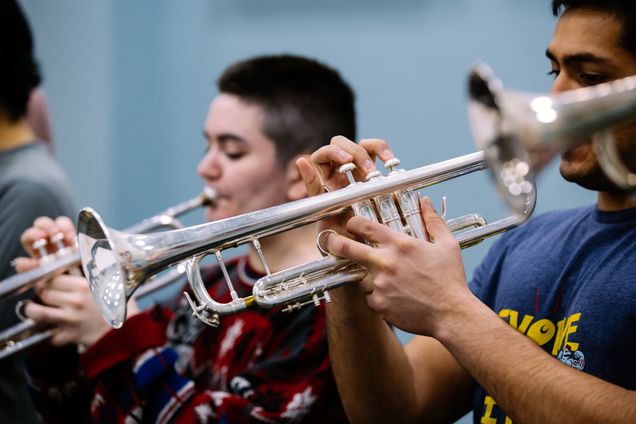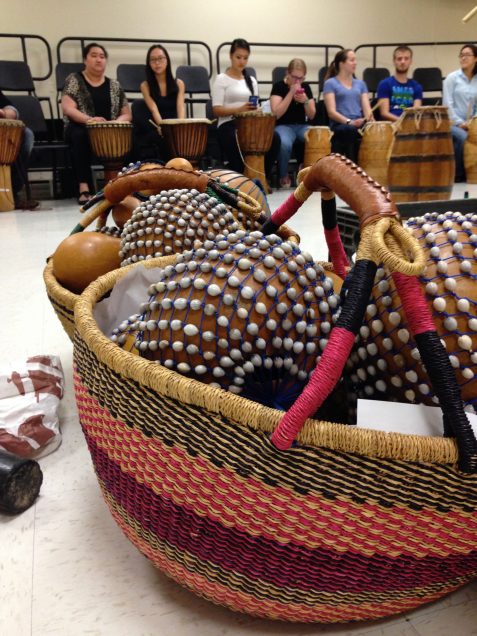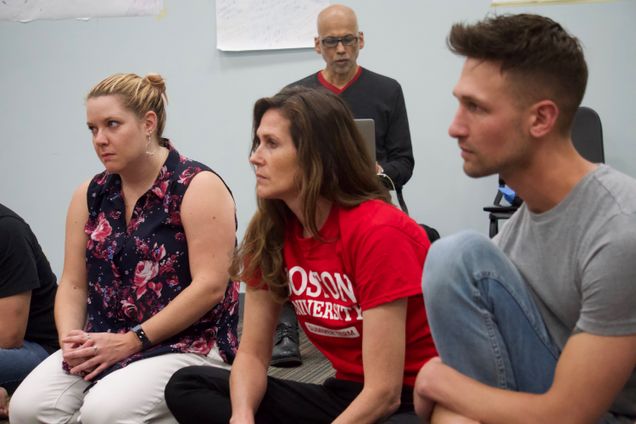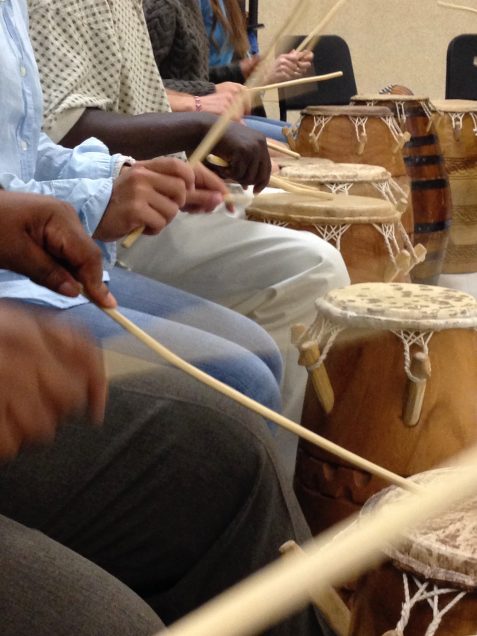The on-campus Master of Music (MM) in Music Education at BU School of Music is built on theory-to-practice learning. We believe that engaging in relevant professional experiences will allow you to practice, reinforce, and reflect on your coursework and, in turn, we believe that coursework should be focused on the practical realities of music education.
There are two MM in Music Education streams offered at on-campus at BU for qualified postbaccalaureate students – Professional Track and Initial Licensure. The Professional Track MM in Music Education is for individuals who already possess PreK-12 teaching licensure in music education or who are not interested in pursuing such licensure. Generally, students applying to this program already possess a Bachelor’s Degree in Music Education. Students are often practicing educators in school, non-profit, and community settings.
During coursework, students explore music education philosophy, curricula, and practice in an effort to work toward a positive, equitable musical future for students and communities around the world. Upon completion of the program, students will be able to design and develop curricula, rationale, and assessments to meet the diverse musical and educational needs and interests of students in various learning ecologies and demonstrate awareness of theoretical, philosophical, and historical traditions that have shaped and continue to influence music education curricula.
The Initial Licensure Track MM in Music Education is for individuals who are interested in receiving initial licensure in PreK–12 Music Education in addition to a Master’s Degree in Music Education. The program provides students who have a previous degree in music with the skills and knowledge needed to teach music in schools, non-profits, and in community settings. In addition to the above aims and learning outcomes of the professional track, students in the licensure track are introduced to the Professional Standards for Teaching and the Subject Matter Knowledge standards through coursework that includes guided observation, mixed-reality simulations, and mock-teaching. Upon completion of the program, students will be able to develop structured lesson plans, organize and analyze results from a variety of classroom assessments, use appropriate practices to accommodate differences in learning styles, create safe learning environments, and reflect on the effectiveness of their lessons through interactions with students and colleagues.
This major is comprised of a closely-knit group of committed music education students and faculty members who value music and its impact. In addition to academic and performance requirements, students fulfill required fieldwork by teaching and observing in local schools and educational settings. The program’s close relationship with Boston Public Schools and other Greater Boston school districts provide numerous opportunities for students to engage in the classroom.
At Boston University, Music Education students have the opportunity to become part of an international student body and a professional network that extends beyond graduation. Often mentorship and research collaborations among faculty and graduates of the program continue as alumni enter their first teaching jobs.
Curriculum requirements for the on-campus MM in Music Education program can be found on the Academic Bulletin.
Program of Study
A supportive, hands-on environment the MM Music Education program on campus includes small class sizes (6-15 students on average) and access to 11 full-time faculty members who are experts in their music education fields as well as dozens of instructors and facilitators. With an emphasis on cutting-edge, research-based pedagogy, Music Education courses are taught by faculty. Teaching assistants are employed to help with instrumental intensives; however, full- and part-time faculty instruct every music education class.
Our faculty include nationally- and internationally-recognized leaders in early childhood and elementary music education; instrumental and choral music education; community music facilitation; music technology; accessible music education; diversity, equity, and inclusion; student leadership; trauma-informed music education; arts integration; rock and pop pedagogy; music and wellbeing; and policy and advocacy.
Students are part of an international student body and a professional network that extends beyond graduation. Often, mentorship and research collaborations among faculty and graduates of the BU Music Ed program continue after studies conclude. Boston University students enter and continue to impact the field of music education as well-prepared and effective teachers.
The program’s long-standing relationship with Boston Public Schools and other urban and suburban school systems and organizations that offer our students rewarding field experiences under the guidance of expert teachers, faculty, and administrators.
Courses aim to connect theory and practice through a wide-variety of learning modalities including traditional on-campus, online, and summer offerings. Graduates will be able to demonstrate expertise in subject matter, adapt and implement standards-based lessons, organize and analyze the results of a variety of assessments, employ inclusive practices that support learning, and create safe learning environments.
The MM in Music Ed also prepares graduates to communicate high standards for learning, reflect on the effectiveness of lessons and interactions with students and colleagues, use professional and personal insights to improve pedagogical practices, develop and design varied curricula, rationale, and assessments, and demonstrate awareness of theoretical, philosophical, and historical traditions that have shaped and continue to influence music education curricula.
Being situated in an urban environment, BU offers a plethora of opportunities to engage in various music teaching and learning contexts. Further, the diverse experiences of our large faculty means that we have researchers and practitioners from a variety of sub-fields within music education.
Boston University offers a number of programs that lead to a professional license or certification. Provided here is state-specific licensure information regarding the Master of Music in Music Education degree program. This information also applies to the Bachelor of Music Education/Master of Music Education 4+1 program as well as the K-12 Music Education Certificate program.
Faculty
-

Kelly Bylica
Assistant Professor of Music, Music Education
-

Diana Dansereau
Associate Professor, Music Education; Chair, Music Education
-

André de Quadros
Professor of Music, Music Education
-

Ruth Debrot
Senior Lecturer, Music Education
-

Andrew Goodrich
Associate Professor of Music, Music Education
-

Karin Hendricks
Director, School of Music; Professor, Music Education
-

Lorenzo Sánchez-Gatt
Lecturer in Music, Music Education
-

Gareth Dylan Smith
Assistant Professor of Music, Music Education
-

Tawnya Smith
Associate Professor of Music, Music Education
-

Kính Vu
Assistant Professor of Music, Music Education

Faculty Feature
Kinh Vu’s Journey from Vietnam Orphan to BU Music Professor
A new book examines what music can do for displaced persons, which this CFA faculty member knows firsthand
By Joel Brown | BU Today
Kinh Vu was an infant when he was abandoned in front of An Lạc Orphanage in Saigon, now Ho Chi Minh City. Like many of the children who landed there, he was given the surname of the woman who ran it, Madam Vũ Thị Ngải.
“This is the gate where I was left outside the orphanage,” Vu says, showing a snapshot of an empty sidewalk and the closed gate. The mundane image belies its gravity for Vu, a College of Fine Arts assistant professor of music. “I have some of that wall, actually, in my office.”


Opportunities
- Applied lessons may lead to performance opportunities in the School of Music including recitals and concerts.
- Students may participate with Arts|Lab, an arts-based initiative at Boston University Medical Campus and Medical Center.
- Boston Afterschool Music Program (BAM) and Boston University Music Engagement (BUME) both provide opportunities for students to participate in music enrichment in the community.
- Students have several ways they can participate in presentations and attend conferences in local, regional, and national organizations including the student chapter of National Association for Music Education (NAfME), Massachusetts Music Educators Association (MMEA), Orff, Kodaly, Dalcroze, and Music Learning Theory local and regional events, the MMEA Professional Development Conference, and the Play On Music Festival.
- There are several University-wide opportunities to engage with and develop music and music education programs including Graduate Research Opportunities Program and Community Service Center Volunteer Programs.


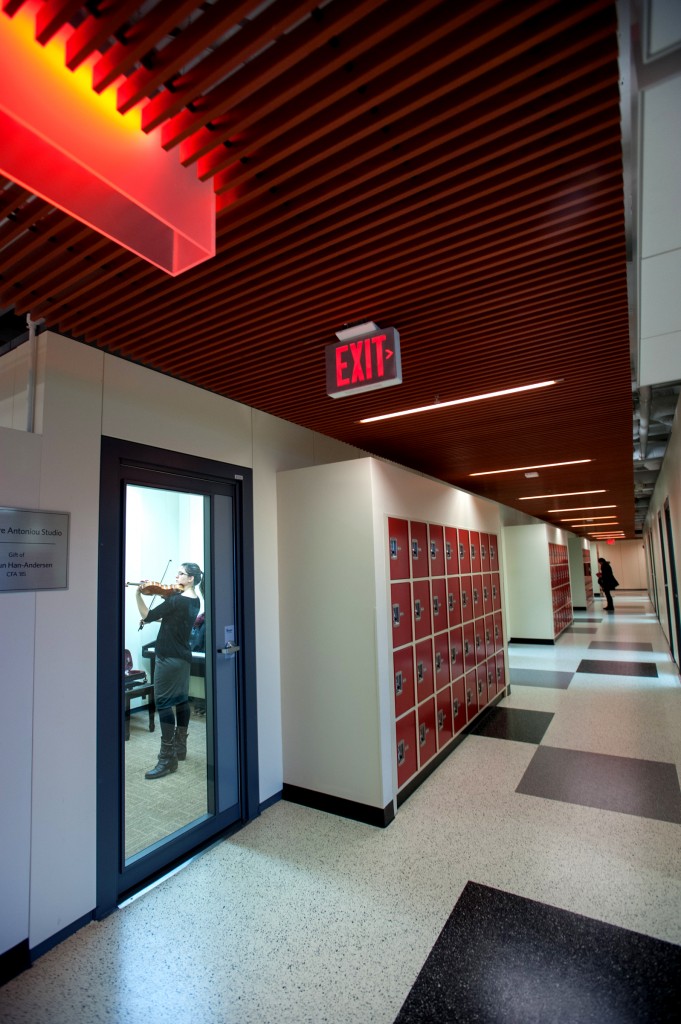
Next Steps for Applicants
The best way to determine if BU is right for you is to explore our admission requirements, financial tools, and resources to determine if the program is the right match. You may also want to consider the Online MM in Music Education at Boston University.
Reach out to Graduate Admissions at visitSOM@bu.edu with any questions along the way or to request information. We are happy to discuss your educational interests and career goals.



